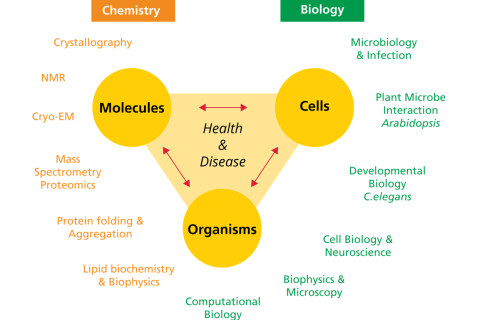Do you want to know how organisms function, develop, and interact with their environment? How you can understand and advance our knowledge of cellular processes at the molecular level? Or how you can develop advanced experimental and computational methods to study biomolecules or biological processes?
Study molecules to solve big issues
The Master’s programme Molecular and Cellular Life Sciences (MCLS) is research oriented and takes a multidisciplinary approach to study molecules related to health and disease in cells and organisms. This may include the development of new medicines and vaccines, new strategies for crop improvement or the 'development' of enzymes to be used in industry. By the end of the programme you will be ready to start a career in biochemical, biomedical, and biotechnological research.
The right choice for you?
This is the ideal Master's programme if you are interested in molecules as the basis of life and disease and if you want to know in which way chemistry, biology, biomedical sciences and physics contribute to the understanding of how these molecules work in cells and organisms. The programme provides you with a broad expertise and experience that will put you in the optimal position for a successful career in one of the many areas of Life Sciences.
Programme objective

You will develop extensive knowledge about cellular processes such as cellular signaling, membrane biogenesis and intracellular transport. You will also learn skills and methods to study the molecules involved in these processes by using biochemistry, structural biology, cell biology, biophysics, computational biology, proteomics and genomics. The programme offers you the flexibility to choose any specialisation within the field of molecular and cellular life sciences.
Why in Utrecht?
- Our Master’s programme is linked to renowned Utrecht research institutes and schools that combine the expertise and education facilities of the science departments with the clinical research of the Faculties of Medicine and Veterinary Medicine. This combination is unique in the Netherlands and has gained a strong international reputation in biomedical and life sciences research.
Freedom to design your own programme, by choosing the track, research project and electives that best fit your interests. You also select one out of 9 thematic profiles which are designed to equip you with skills for your future career in a direction that appeals you most.
- As part of the Graduate School of Life Sciences (GSLS) you get an interdisciplinary approach. The GSLS brings together the research expertise and facilities of the faculties of Science, Medicine and Veterinary Medicine, in cooperation with UMC Utrecht.
Key facts
- Degree:
- Biosciences (MSc)
- Language of instruction:
- English
- Mode of study:
- Full-time
- Study duration:
- 2 years
- Start:
- September
- Tuition fees:
- Dutch and other EU/EEA students (statutory fee, full-time) 2024-2025: € 2,530
Non-EU/EEA students (institutional fee) 2024-2025: € 23,765
More information about fees - Croho code:
- 68713
- Accreditation:
- Accredited by the NVAO
- Faculty:
- Science
- Graduate school:
- Life Sciences
- Brochure:
- Request a brochure

